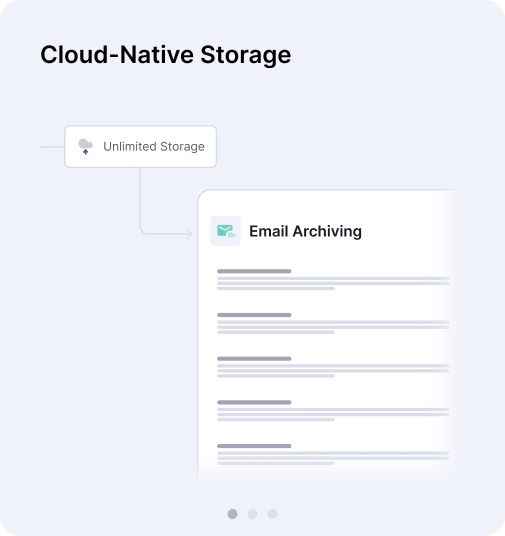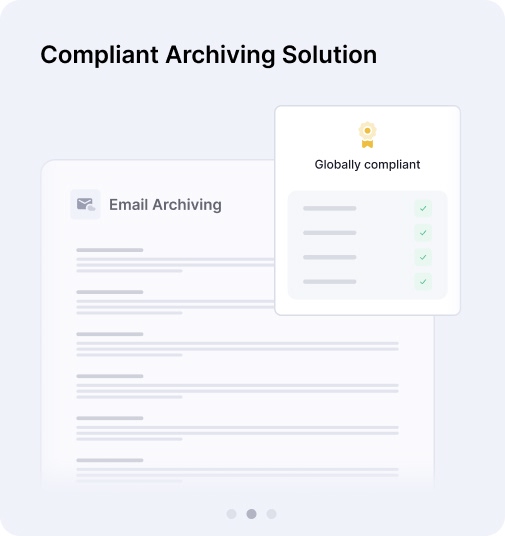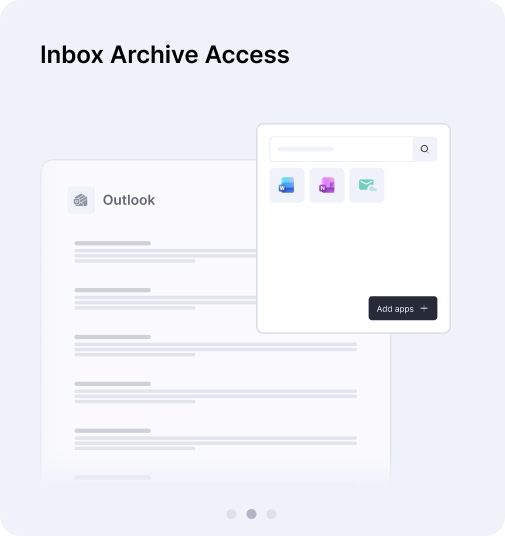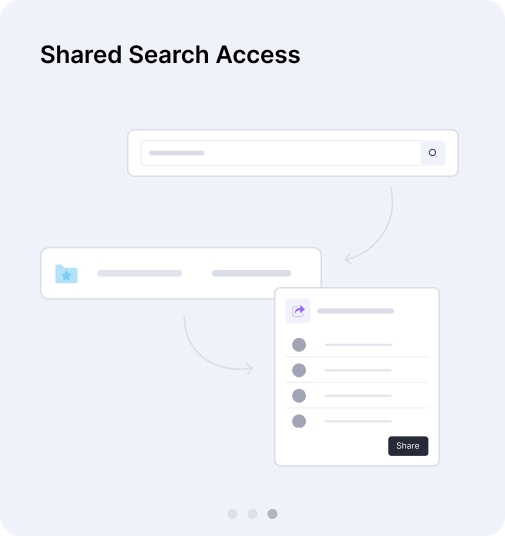What is email archiving?
Email archiving requires a thorough approach that captures and preserves emails, attachments, and calendars. Essential aspects of an email archiving solution include security, privacy, and discoverability. An advanced email archiving solution must also ensure compliance with various regulations, including the EU's GDPR, Sarbanes-Oxley, HIPAA, FINRA, and other global standards. An email archiving solution provides specific features that provide essential services for a company.
Email archiving solutions:
- Provide the correct documentation and traceability for audits and investigations.
- Facilitate e-discovery for litigation requirements.
- Maintain regulatory compliance that affects email storage and security, and data recovery.
- Retain your organization’s knowledge base that resides in your email communications.
- Enable encryption and enforce access control to protect emails and attachments.
- Provide secure storage and maintain vast amounts of email-based data to offset the strain on networks. This improves email server performance


Which regulations require email archiving?
Data regulations that affect emails are worldwide and can have broad implications for a company. For example, data protection regulations require that sensitive information, including email content and attachments, is secure and that privacy is upheld. Any system, such as email, will fall under the umbrella of these regulations. For example, the EU’s General Data Protection Regulation (GDPR) requires that a company have the "ability to restore the availability and access to personal data promptly in the event of a physical or technical incident."
Specific laws governing email retention establish stringent rules that impact email archiving. The regulatory bodies, the Securities and Exchange Commission (SEC) and the Financial Industry Regulatory Authority (FINRA), expect a covered organization to maintain an archive of its electronic communications, including email. The SEC record keeping rules require brokerage firms, for example, to "preserve electronic records exclusively in a non-rewritable, non-erasable format, known as the write once, read many format." FINRA has similar email archiving rules.
How does an email archiving solution work?
Email archiving should be simple and not interfere with standard working patterns; the email archive solution integrates deeply with an organization's email system. Modern email archiving solutions are cloud-based and run as a service. Granular policies are used with automation to intercept and send inbound, external, and internal emails to a cloud-based archive.
Granular policy settings ensure that email archiving policies align with the organization's needs and relevant regulations. The configuration of settings enforces email archiving at the office, department, user group, and individual levels.
Once archived, the tamper-proof emails and attachments are retained in accordance with the policy rules. E-discovery allows for fast and accurate search and retrieval. The email archives are automatically backed up to ensure that email data is protected and easily recovered in the event of a disaster.

Essential features of an email archiving solution
Cloud-based
Cloud-based email archiving enables the provisioning of email archives across an expanded organisation, including its remote workforce. Cloud-based email archiving provides a means to consolidate and manage business email data, ensuring compliance across diverse work environments.
Enforcement of retention policies
Regulations differ in the length of time an email must be stored. Email retention policies must be configurable to reflect the regulatory requirements of your industry sector. An easy-to-use interface should enable the configuration and modification of these settings as needed.
Authentication and access control
Encryption is powerless without robust authentication and access control. Authentication options should include password hashing, support for digital certificates, Active Directory and LDAP, Google authentication, and Windows single sign-on (SSO) authentication. Role-based access control (RBAC) is used to enforce the principle of least privilege.
Search and retrieve
Many regulations require that emails be made available upon request. Search and retrieve must be fast and accurate.
Legal hold and deletion request features
A legal hold, also known as a preservation order or document hold notice, is used to preserve relevant electronic information for use during an active eDiscovery request in litigation. Audit trails, integrity checks, and policy updates must be readily available to meet litigation and other regulatory compliance.
Compliance reporting and audit trails
Audit trails are part of documentary evidence. An email archiving solution should generate comprehensive reports.
Automation
Email archiving solutions should provide automation to ensure that email retention policies are enforced in real-time. In automating the archiving process, mistakes that could cause emails to be missed are prevented.
Traceability
Evidence is a vital aspect of regulatory compliance and audit trails, and traceability is part of the legal requirements of many regulations. Some advanced email archiving systems provide a tool for data guardians, such as Data Retention Officers and Security Data Access Officers, to approve and track access, deletion, and legal hold requests.
Support for a variety of email data
An email archiving service must support a broad range of data types, including legacy email data.
Layers of security that complement email archiving
Adds a layer of email filtering and security to ensure that phishing emails or those carrying malware are prevented from entering users’ inboxes. This helps to maintain a secure version of an email archive.
Another essential layer of security focuses on employees, contractors, and other non-employees. Security awareness training, combined with phishing simulations, provides the necessary education to inform and empower users. Emails that slip through the net can be identified by the recipient and reported before they become an incident.
Phishing emails often contain malicious links that, if clicked, direct users to a spoofed website where login credentials and other sensitive information are stolen. Preventing people from navigating to these websites is performed by a DNS filtering solution. Even if an email slips through the layers of security, a DNS filter will stop the cyberattack in its tracks.
It may seem that email archiving and email backup are the same, but they are distinct. However, the two can be viewed as complementary, each offering different features. Email archiving is designed to ensure regulatory compliance, while also providing advanced eDiscovery capabilities. Email archives are also built for retention periods that are typically much longer than those in email backups. As such, an email backup solution provides a snapshot of emails and attachments that are recoverable in disaster scenarios, whereas email archiving provides for legal requirements, such as eDiscovery.
Email archiving for MSPs
Managed service providers (MSPs) can offer their clients email archiving that is fast, accurate, and secure. An MSP can provide enhanced services that go beyond email archiving to deliver unified bundles that incorporate email backup, security awareness training, and ICES. To provide effective, scalable email archiving and email protection, an MSP should go beyond the core features of an email archiving solution to include three key pillars:
Multi-tenant management
A centralized, cloud-based console that lets MSPs manage all customers in one place, reducing administrative overhead.
Automated protection
Fast, automated onboarding to quickly add new accounts without manual complexity.
Cross-sell readiness
Seamless bundling with Microsoft 365, Azure Blob, and Entra ID to increase value and margins.

Ready to get started?

